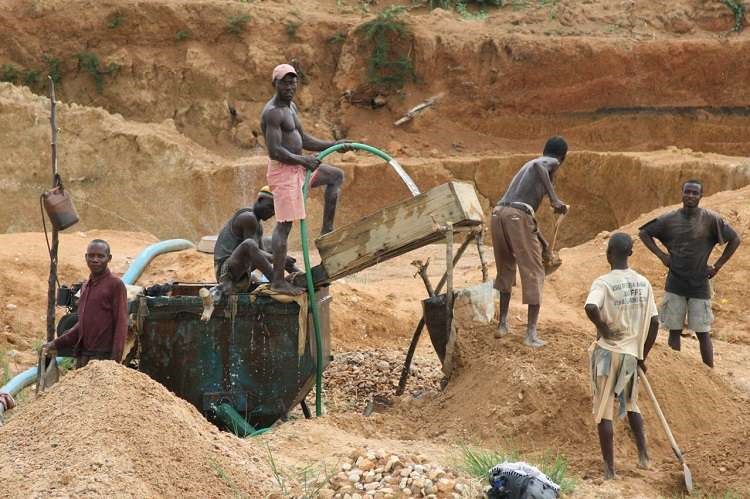By Nelson Ayivor
The issue of galamsey has long plagued Ghana, with its devastating environmental impact visible in poisoned rivers, degraded farmlands, and communities struggling with contaminated water sources.
However, political commentator and IMANI Africa associate volunteer Kay Cudjoe has raised an even more alarming concern: illegal gold mining may not only be destroying the environment but could also be secretly financing Ghana’s political machinery.
Cudjoe explained that this suspicion is not rooted in conspiracy but in a growing body of evidence that demands urgent national investigation.
According to him, the escalating cost of running for the presidency in Ghana is now so high that ordinary contributions from party members and grassroots supporters cannot possibly cover it.
“Running for president in Ghana has become ruinously expensive. The Ghana Center for Democratic Development (CDD Ghana) estimates that a viable presidential campaign now costs more than $200 million.”
This staggering figure has transformed Ghana’s elections into what researchers Franklin Oduro and Kojo Pumpuni Asante describe as “a billionaire’s game.”
Their warnings, echoed by a 2021 study by the Westminster Foundation for Democracy, point to a growing risk that campaign coffers could become infiltrated by illicit funds.
Without proper oversight, candidates may be forced to rely on shadowy financiers with questionable motives.
Galamsey Financiers Under Suspicion:
Cudjoe noted that suspicions are increasingly falling on illegal mining financiers.
These individuals, enriched through galamsey operations that exploit Ghana’s mineral wealth, are believed to have both the resources and the political motives to bankroll high-cost campaigns.
Civil society voices have already begun speaking out. In 2024, former Volta River Authority CEO Kweku Awotwi bluntly stated that “a lot of the money is being used to support political parties,” referring directly to funds generated from illegal mining.
Adding to these concerns, Dr. Ayew Afriyie, the NPP MP for Effiduase Asokore and Chairman of Parliament’s Health Committee, openly declared at the launch of the Bawumia Volunteers 2024 in Kumasi that the government would not ban galamsey “today or tomorrow.”
He argued that taking a hardline stance could cost the party crucial support in mining communities.
Accordingly, Cudjoe emphasized that such a statement should have triggered a parliamentary investigation, but instead, it was met with silence.
Meanwhile, Ghana’s past attempts to tackle galamsey also raise troubling questions about political interference. Operation Vanguard, a military-backed initiative launched in 2017, was touted as a decisive effort to eradicate illegal mining. Hundreds of excavators were seized during the early stages of the campaign.
However, by 2020, many of those machines had mysteriously vanished. Former Minister of Environment Professor Kwabena Frimpong Boateng alleged that some of the missing equipment had been redirected to benefit ruling party financiers.
These explosive claims were never fully investigated, leaving the public with more questions than answers.
A 2025 joint study by researchers from the University of Ghana and Wageningen University, published in World Development, provided a sobering conclusion: anti-galamsey operations repeatedly fail because “illegal mining rents are captured by ruling party elites and their supporters.”
While not direct proof of guilt, Codjoe argued that the study points to systemic corruption where enforcement collapses due to collusion between politicians and mining financiers.
Bipartisan Complicity:
One of the most disturbing aspects of the crisis, according to Kay Codjoe, is that both the NPP and the NDC appear entangled in this web of complicity.
While in opposition, parties publicly condemn galamsey and promise reforms. Yet, once in power, their rhetoric softens, and enforcement efforts fade.
This cycle, he explained, is fueled by financiers who strategically donate to both major parties. By hedging their bets, these backers ensure that whichever side wins, they will enjoy political protection.
This bipartisan hypocrisy creates paralysis: every government promises to save Ghana’s rivers, but every administration ultimately treats the land as collateral for election victories.
“These questions remain unanswered. Who truly funds Ghana’s $200 million campaigns? What became of the seized excavators from Operation Vanguard? How many constituencies in the gold belt saw campaign financing linked to galamsey financiers? What role do traditional authorities play in shielding illegal mining sponsors?”
Accordingly, he emphasized that unless these allegations are thoroughly investigated with full transparency, Ghana’s fight against galamsey will continue to be undermined by the very people responsible for enforcing it.
A Path Toward Transparency:
Cudjoe stressed that if these allegations are true, Ghana faces not only an ecological catastrophe but also a democratic crisis.
He proposed a series of systemic reforms to restore public trust. These include establishing a bipartisan commission of inquiry with subpoena powers to investigate campaign financing in mining areas since 2008, and amending the Political Parties Act to require audited campaign accounts to be published before every election.
He also called for legislated spending caps on political campaigns and the adoption of digital fundraising platforms to reduce reliance on large private financiers.
Strong laws must criminalize the acceptance of campaign funds from illegal enterprises, with prosecutions focused on the “big men” who profit from galamsey, rather than only targeting the desperate youth found digging in the mud.
“This is not about partisan blame. It is about whether Ghana’s democracy is being silently mortgaged to poisoned gold. Until we follow the money, we cannot honestly say we are fighting galamsey.”
He concluded by stressing that without transparency and accountability, every election celebrated by Ghanaians could be an election funded by mercury and mud. “Ghana has long been called the Black Star of Africa. But a star fed by poisoned rivers cannot shine forever.”


